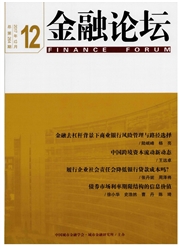

 中文摘要:
中文摘要:
本文以2000~2011年中国上市公司为样本,采用现金-现金流敏感性检验融资约束假说对我国上市公司的适用性,在此基础上研究外部冲击对不同融资约束企业现金持有规模的影响。研究表明,融资约束企业具有正的现金-现金流敏感性,且敏感性系数在受到金融危机冲击后大幅提高;非融资约束企业在金融危机前后都没有显著的现金-现金流敏感性。货币政策对两类企业的现金持有规模均有影响,货币政策主要通过影响长期贷款在总资产中的占比变化进而影响现金的持有,即仅在长期贷款占比提高时,企业的现金持有水平会大幅降低。
 英文摘要:
英文摘要:
The Chinese listed companies during 2000-2011 as samples, this paper applies the cash flow sensitivity of cash to examine the applicability of financing constraints hypothesis for the Chinese listed companies, and based on the examination, re- searches the influence of external shocks on the cash holding sizes of the enterprises in different financing constraints. The study of the paper shows that the financing-constraint enterprise has a positive cash flow sensitivity of cash and the sensitivity coeffi- cient increases greatly after the shock of the financial crisis; the non-financing-constraint enterprise has no obvious cash flow sensitivity of cash before or after the financial crisis. Monetary policies impact the cash holding sizes of the two kinds of enter- prises. The monetary policies affect the cash holdings mainly by affecting the ratio of long-term loans to total assets, which means that the cash holdings of the enterprise will greatly decrease only when the ratio of the long-term loans rises.
 同期刊论文项目
同期刊论文项目
 同项目期刊论文
同项目期刊论文
 期刊信息
期刊信息
